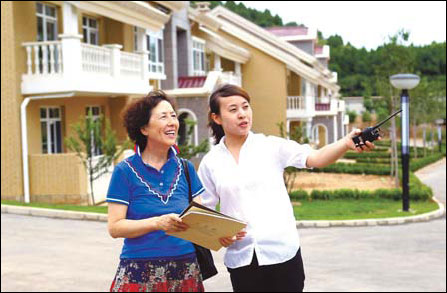Biz Unusual
Seniors scramble for care homes
By Yang Wanli (China Daily)
Updated: 2010-09-08 16:11
 |
Large Medium Small |
|
 |
|
Zhu Lingying (left) seeks advice from a saleswoman at Yaoyang International Apartments. [Zou Hong / China Daily] |
Beijing's expanding population of seniors and its shortage of nursing homes has led to a scramble for space in care facilities - not only among Beijing's pensioners but even among people in their 50s looking for a place to spend their twilight years.
Yaoyang International Apartments, the city's first luxury apartment building for elderly residents, has already attracted 20 would-be residents, despite only opening on Aug 28 and in the face of its high-end rents of 60,000 yuan a year.
Despite being aimed at senior citizens, most of the people wanting to live in the sheltered accommodation are younger than 60, said staff.
Others include sprightly senior citizens who need sheltered housing because their families are too busy to care for them.
"I plan to sell my house and buy an apartment here," said Zhu Lingying, a 65-year-old retired flight attendant who viewed the complex on Tuesday.
"The hospitals and special services for elderly people are what attract me the most."
Her two children both work in downtown Beijing and she said they are busy so she does not want to be a burden to them.
"Good nursing homes in the downtown area are all full," she said. "I have to decide quickly. Otherwise, there will not be any apartments available."
The Yaoyang apartments claim to be able to meet almost all needs of elderly residents.
Its 343 units are equipped with obstacle-free facilities and emergency buttons and the complex has a free swimming pool, tennis facilities, a college for senior people and a medical center.
According to the Beijing Committee on Aging, the city has more than 2.6 million people who are older than 60 and that number is set to grow to 4 million by 2020, accounting for 20 percent of the total population.
By 2050, the number of over-60s will hit 6.5 million and one in three Beijingers will be older than 60.
But there are only a total of 62,000 beds for elderly people in the city's 386 nursing homes, according to the committee.
Although more than 6,000 of those beds were added during the first half of this year, experts say the number is still far from meeting the demand.
"The aging population will be a severe problem in the future and providing more nursing homes and elderly people's apartments will undoubtedly become a trend in future," said Qi Shuying, the director of Sijiqing Nursing Home.
Sijiqing is one of Beijing's most famous nursing homes targeting wealthier seniors.
Sijiqing raised its prices this month from 1,050 yuan a month to 1,700 yuan. There too, the relatively high rent is no deterrent.
Qu Xiuhan, an 82-year-old widow who has lived in Sijiqing for more than a year, said she enjoys the sheltered accommodation.
"I don't have to worry about cooking any longer and it is quieter than the downtown area," she said.
Qu says her major challenge is dealing with her loneliness.
"I have some peers to talk to and I share my feelings with them," she said. "My going to a nursing home was the only and best choice for us and it will also be the case for many one-child families in the future."
In Youfu Nursing Home, a private complex in Haidian district, rooms are also in great demand.
A receptionist surnamed Zhang said all 200 beds are occupied.
The nursing home added 60 beds in April to try to keep up with demand.
Zhang said more than 95 percent of elderly people in Youfu have sons and daughters, but the burden of living and working are too heavy for many middle-aged residents in Beijing.
"They have no time to look after their aged parents and all they can do is send them to a nursing home," Zhang said.
Wang Shuixiong, a sociologist from Peking University, said it will become more and more acceptable in future for seniors to live in nursing homes, instead of being cared for by their families.
"Rather than being seen as a last resort, we should be building more nursing homes and providing better services for more people," he said.



